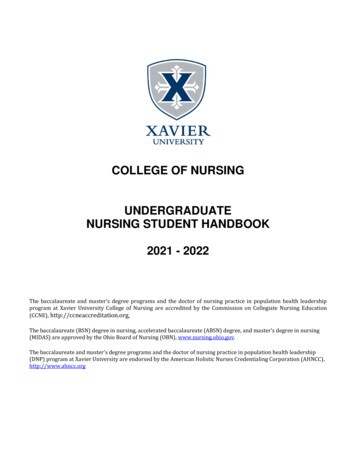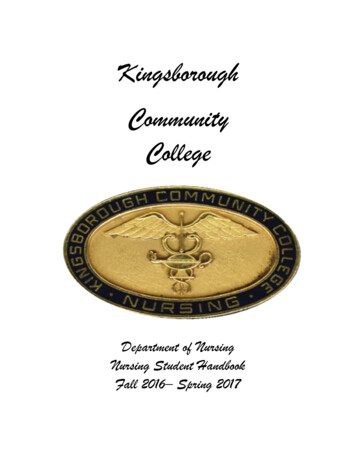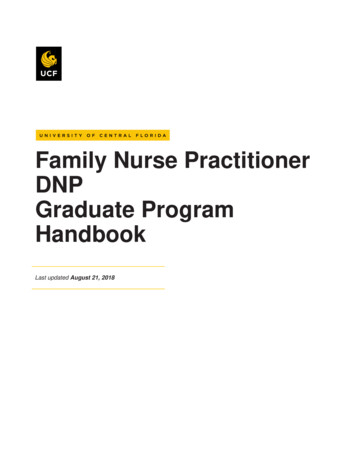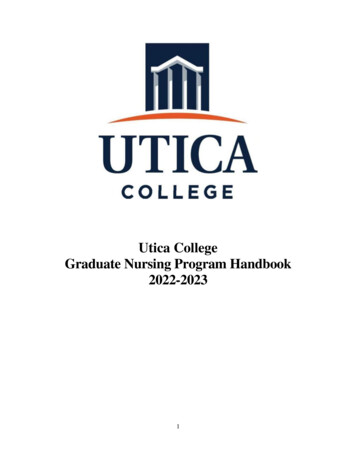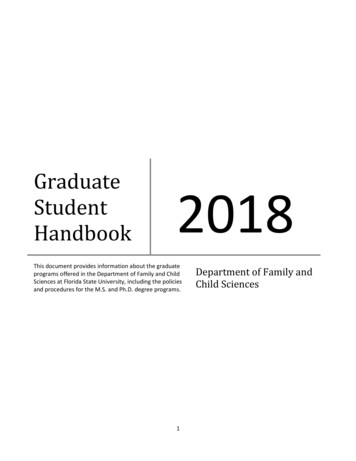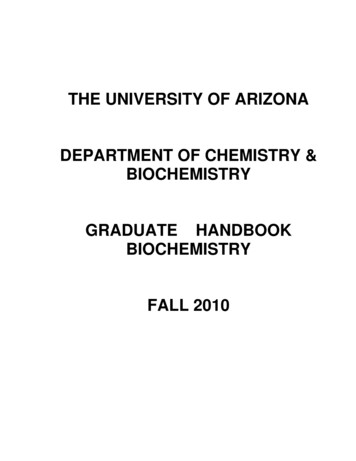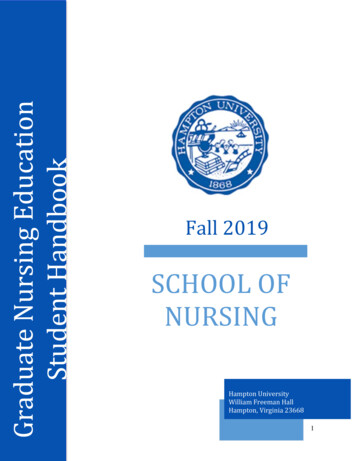
Transcription
Graduate Nursing EducationStudent HandbookFall 2019SCHOOL OFNURSINGHampton UniversityWilliam Freeman HallHampton, Virginia 236681
PagePurpose of School of Nursing Handbook 3Accreditation Status 3Hampton University Code of Conduct . 4Historical Overview of the School of Nursing . 5Department of Graduate Nursing Education Overview . 8Department of Graduate Nursing Education Terminal Objectives . .9Department of Graduate Nursing Education Theoretical Framework .10Committee on Graduate Scholarship, Standards and Admission Interview Form27Department of Graduate Nursing Education Admission Requirements 29Curriculum Master’s Program . .32Clinical Guidelines Masters Program . 53Preceptor Forms for Nurse Practitioner, Nurse Educator and Nurse Administrator57Curriculum PhD Program . . .88Appendix . 102A – Student-Instructor Conference Sheet;B – Application for Admission to Candidacy for Degree Completion;C - Tentative Schedule for Graduation; D – Grievance Procedure;E – Financial Information; F – Professional Ethics & ANA Code of Ethics;G – Disability Services; H - Masters Essentials (Website);I – Acknowledgement Receipt.2
FOREWORDWelcome, Graduate Students!On behalf of the Graduate Council, faculty and research scientists, and staff, it is my pleasureto personally welcome you to the Graduate College at Hampton University. As we collectivelyfocus our attention on character-building at all academic levels, including graduate education,Hampton University continues to excel in scientific and technological advancements, whileretaining its emphasis on graduate scholarship and research efficacy.We are pleased that you have chosen Hampton University as the institution for your advancedstudy. This Student Handbook, prepared by the Graduate College, outlines your responsibilitiesas a Hampton University graduate student. The Academic Catalog, the Official StudentHandbook, and the Graduate College’s website, http://gradcoll.hamptonu.edu/, are additionalresources, containing important information about university policies and procedures.In closing, please know that all Graduate Council members, faculty and staff, “stand ready”to respond to your questions and concerns throughout that your matriculation at our “Homeby the Sea.”Best Wishes,Michelle Penn-MarshallVice President for Research and Associate ProvostDean of the Graduate College3
MESSAGE FROM THE DEANFuture Nurses and Graduates of Hampton University School of NursingWelcome to the opening of what promises to be a challenging, and spectacular academicyear! This time of year brings great anticipation about what is to come, and I am as excitedas the faculty and staff about your return although remotely. You have chosen a career that isconstantly evolving. The nurse of today is not one who donned a white uniform and cap somefifty plus years ago. The new millennium healthcare worker embraces change, thinks critically,behaves professionally and responds appropriately. Your matriculation through the School ofNursing will facilitate your separation from dependence upon your parents/guardians to one ofindependence and maturity.To successfully evolve into a healthcare professional, you must embrace the notion that college ischallenging and rigorous. Therefore, write your vision and make it plain “I AM A . . .”Surround yourself with positive people who embrace the same ideals. Focus on your studies,my mother always told me “Anything worth having, is worth working hard for.” Enjoy lifeand take care of yourself, take time out of each day to engage in an activity you enjoy. Youowe that to yourself. Utilize your resources within the School of Nursing and around theuniversity. Set aside a period of time each day to focus on every class; create a schedule andstick to it. Reward yourself when you do well, don’t beat yourself up when you fail. The markof a person of good character is that you can rise after you have fallen.Most importantly, you must believe that it can be accomplished! With hard work and dedication,you too can and will graduate and enter into the healthcare career of your choice. The COVID19 pandemic has brought about rapid and evolving challenges and uncertainty for us all. This isyour time to rise to the occasion and remember the mission, to become a dedicated professionalstriving to promote, protect and provide care for those in need. Be safe and stay safe!Sincerely,Shevellanie LottShevellanie LottPhD, RN, CNEDean4
PURPOSE OF SCHOOL OF NURSING HANDBOOKThe School of Nursing Student Handbook is prepared to assist nursing students with theirstudent and professional socialization, an integral part of Hampton University, the School ofNursing, and the profession of nursing. The purpose of the established regulations andinformation included in the Student Handbook is to assist the undergraduate nursing studentwith professionalism and to assist the graduate nursing student with continued growth andself-actualization. Each nursing student is expected to read the Student Handbook thoroughlyand to become knowledgeable about the codes and regulations included. The StudentHandbook serves as the authority in governing the conduct and behavior of HamptonUniversity nursing students. This handbook supplements the official student handbook, Living,Learning, Leadership and Service at Hampton University, as well as the current AcademicCatalog. Each nursing student should refer to the Student Handbook frequently as well as theother official publications of Hampton University for guidance and clarification of policies andpractices expected of Hamptonians. Members of the School of Nursing faculty, staff, andadministration are prepared to assist you whenever necessary.The handbook does not confer a contract and the university reserves the right to changeany provision, offering, requirement, or fee at any time within the student’s enrollmentperiod. Further, the university reserves the right to require students to withdraw for causeat any time.ACCREDITATION STATUSThe baccalaureate programs on Hampton University main campus and College of VirginiaBeach has full approval by the Virginia State Board of Nursing.The baccalaureate degree programs in nursing and the master's degree programs in nursingat Hampton University are accredited by the Commission on Collegiate Nursing Education,655 K Street NW, Suite 750, Washington, DC 20001, 202-887-6791.655 K Street NW, Suite 750Washington, DC 20001P: (202) 887-6791F: (202) 887-8476Website: https://www.aacnnursing.org/CCNE-Accreditation5
HAMPTON UNIVERSITY CODE OF CONDUCTJoining the Hampton Family is an honor and requires each individual to uphold the policies,regulations, and guidelines established for students, faculty, administration, professional and otheremployees, and the laws of the Commonwealth of Virginia. Each member is required to adhere toand conform to the instructions and guidance of the leadership of his/her respective area. Therefore,the following are expected of each member of the Hampton Family:1. To respect himself or herself.Each member of the Hampton Family will exhibit a high degree of maturity and self-respect andfoster an appreciation for other cultures, one's own cultural background, as well as the cultural matrixfrom which Hampton University was born. It is only through these appreciations that the future ofour university can be sustained indefinitely.2. To respect the dignity, feelings, worth, and values of others.Each member of the Hampton Family will respect one another and visitors as if they were guests inone's home. Therefore, to accost, cajole, or proselytize students, faculty or staff, parents or others,to engage in gender and sexual harassment, use vile, obscene or abusive language or exhibit lewdbehavior, to possess weapons such as knives or firearms, or to be involved in the possession, use,distribution of and sale of illegal drugs is strictly prohibited and is in direct violation of the HamptonUniversity Code, on or off campus.3. To respect the rights and property of others and to discourage vandalism and theft.Each member of the Hampton Family will refrain from0 illegal activity, both on and off campus, andwill be subject to all applicable provisions listed in the Faculty Handbook, Personnel Policies Manualfor Administrative/Professional and Nonexempt Employees, the Official Student Handbook, and theHampton University Code.4. To prohibit discrimination, while striving to learn from differences in people, ideas, andopinions.Each member of the Hampton Family will support equal rights and opportunities for all regardless ofage, sex, race, religion, disability, ethnic heritage, socio-economic status, political, social, or otheraffiliation or disaffiliation, or sexual preference.5. To practice personal, professional, and academic integrity, and to discourage all formsof dishonesty, plagiarism, deceit, and disloyalty to the Code of Conduct.Personal, professional, and academic integrity is paramount to the survival and potential of theHampton Family. Therefore, individuals found in violation of Hampton University's policies againstlying, cheating, plagiarism, or stealing are subject to disciplinary action, which could possibly includedismissal from the University.6. To foster a personal professional work ethic within the Hampton University Family.Each employee and student of the Hampton Family must strive for efficiency and job perfection. Eachemployee must exhibit a commitment to serve and job tasks must be executed in a humane and civilmanner.7. To foster an open, fair, and caring environment.Each member of the Hampton Family is assured equal and fair treatment on the adjudication of allmatters. In addition, it is understood that intellectual stimulation is nurtured through the sharing ofideas. Therefore, the University will maintain an open and caring environment.8. To be fully responsible for upholding the Hampton University Code. Each member of theHampton Family will embrace all tenets of the Code and is encouraged to report all code violators.(Academic Catalog 2018-2020)6
HISTORICAL OVERVIEW OF THE SCHOOL OF NURSINGThis modified version of the history was compiled from the following: Fifty Years of NursingExcellence: The Legacy Continues, 1944-1994; A Historical Overview of the Nursing Program atHampton Institute by Patricia E. Sloan; History of the Department of Nursing written under theguidance of Director and Chair Fostine G. Riddick; and the Hampton University School of Nursing:Self-Study Report for Reaffirmation of Accreditation (2000) written under the guidance of DeanPamela V. Hammond.1891The Kings Chapel Hospital for Colored and Indian Boys, Abbey Mae Infirmary, and theHampton Training School for Nurses were started on the campus of Hampton Institute.Alice Bacon was instrumental in starting the Hampton Training School for Nurses. Theschool was commonly called Dixie Hospital, and its first graduate was Anna DeCostaBanks.1931Nina Gage appointed director of the Hampton Training School for Nurses.Students earned a diploma from a three-year program from Hampton Institute.1934Ruth J. Hopper appointed director (1934-1936).1936Clara G. Lewis appointed director (1936-1939).1943J. Henry Suttergood, chairman of the Board of Trustees of Hampton Institute, soughtapproval for a nursing program. Program and provisions were made in the 1943-44budget. Mary Elizabeth Lancaster (Carnegie) appointed acting director of the Divisionof Nurse Education. She implemented the first continuous baccalaureate nursingprogram in the Commonwealth of Virginia.1944Cecile E. Authier appointed director of the Division of Nurse Education.Professional nursing courses were taught on affiliations, sometimes in distant cities: St.Philip School of Nursing in Richmond, Virginia; Brooklyn State Hospital in Brooklyn, NewYork; Union of the King’s Daughter’s; and the Visiting Nurse Service, Norfolk, Virginia.Due to limited clinical opportunities for African Americans, clinical affiliations in publichealth were expanded to Staten Island, New York; Washington, D.C.; and Bayonne andHackensack, New Jersey.1946Island, New York; Washington, D.C.; and Bayonne and Hackensack, New Jersey.19521953The nursing program received temporary accreditation from the National League forNursing.Helen M. Sellers appointed acting director of the Division of Nurse Education.1957Harriet E. Broward appointed director of the Division of Nursing.1963Fostine G. Riddick appointed director of the Hampton Institute Division of Nursing.1967Undergraduate nursing program received full accreditation from the National League forNursing.7
William Freeman Hall was designed by the nursing faculty and completed.1968Registered Nurse Program received National League for Nursing accreditation.1971Dr. Lois B. Sellers appointed director of the Division of Nursing. She was the first AfricanAmerican nurse to serve on the State Board of Nursing.1975First continuing education nursing program established at Hampton Institute.1976Master’s program initiated—the first ever at a Historically Black College or University(HBCU). Chi Eta Phi Sorority chartered a chapter on campus.1977Dr. Patricia E. Sloan established the M. Elizabeth Carnegie Nursing Archives, the firstarchives in the U.S. designated as a repository for memorabilia on minority nurses,especially African American nurses.1978The first annual national Conference on the Black Family held by the NursingDepartment.1979Master’s program accredited by the National League for Nursing.1980Dr. Elnora D. Daniel appointed dean of the School of Nursing.Sigma Theta Tau, International Honor Society of Nursing Inc., National Honor Society,established a chapter on campus.1986The Hampton University Interdisciplinary Nursing Center for Health and Wellness, whichwas later renamed the NursingCenter, was established.Dr. Elnora D. Daniel, dean of the School of Nursing, became the second African Americanappointed to the Virginia StateBoard of Nursing and its first African American president.The School of Nursing receives its first NIMH research grant.The Teagle LPN to BS initiative began.Dr. Bertha L. Davis appointed dean of the School of Nursing.Dr. Arlene J. Montgomery appointed interim dean of the School of Nursing.Dr. Pamela V. Hammond appointed dean of the School of Nursing.PhD program initiated—the first ever at a HBCU.The School of Nursing was reaccredited for 8 years by the National League for NursingAccrediting Commission and for 10 years by the Commission onSchool of Nursing signed articulation agreement with Bermuda College.Dr. Phyllis Henderson became the first student to graduate from the School ofNursing’sdoctoral program. First graduates of Women’s Health Nurse PractitionerProgram—Stephanie Stephens and Charlette King1990199119961998199920012002200320042005School celebrated the 25th Anniversary of the Conference on the Black Family.The School of Nursing pioneered a new 3-year accelerated baccalaureate program atthe Hampton University College of Virginia Beach.School celebrated the 60th Anniversary of Baccalaureate Education with a gala entitled“60 Years of Baccalaureate Education:The School of Nursing programs at the Hampton Institute campus and Virginia Beachcampus receive approval for 8 yearsfrom the Virginia Board Nursing.First students graduate from the College of Virginia Beach Nursing Program.8
2009Dr. Arlene J. Montgomery appointed dean of the School of Nursing.2011Dr. Hilda M. Williamson appointed interim dean of the School of Nursing.Dr. Deborah E. Jones appointed dean of the School of Nursing.2015Dr. Hilda M. Williamson appointed Interim Dean of the School of Nursing.Dr. Shevellanie E. Lott appointed dean of the School of Nursing. The baccalaureateprogram was re-accredited for 10 yearby the Commission on Collegiate NursingEducation.2016The baccalaureate program was re-accredited for 10 years by the Commission onCollegiate Nursing Education.School celebrated the 125th anniversary of nursing education at Hampton Universityand received full Board of Nursing approval for 10 years.2017Implemented the Bachelors of Science in Health Science degree with twoconcentrations: Community Health Promotion and Policy Administration.2018The school celebrated the 75th Anniversary of the Bachelor of Science in Nursingprogram, which continues to be the oldest baccalaureate program in the Commonwealthof Virginia.2019The School of Nursing hosted the 41st Conference on the Black Family titled: Health ofthe Black Family: How to Add Years to your Life and Life to your years. The keynotespeaker was Dr. L.D. Britt and the honored family was Mr. and Mrs. Charlie andBethune Hill.2019First graduates of the Bachelors in Health Sciences program in Community HealthPromotion and Policy and Administration - Kierrah Friend, Kazhmira Foster, BrittanyJohnson, Latasha Johnson, Nicole King, Cameron Meade, Chyanne Parkinson, DasiaThompson and Aliyah Williams.The School of Nursing established the Gerontology Center of Excellence and a minor inGerontology. Dr. Ethlyn Gibson was appointed director and Program Coordinator.More than One Hundred Twenty Five Years of Nursing Education9
VISION STATEMENTTo empower multicultural nurses to excel in evidence-based nursing practice and research toservice the global community.MISSION STATEMENTOur mission is to maintain the highest quality of professional nursing education at all levels. We willcontinue to serve an increasingly diverse student population while becoming the premier producerof multicultural nurses with an advanced degree with a focus on family health within the globalcontext.SCHOOL OF NURSING GOALSThe Hampton University School of Nursing has the broad goal of improving health care andthe overall quality of life locally and globally. It strives to reach this goal through the education ofhealth care professionals, through provision of expertise and health care services, through researchin promotion of wellness and family health. The School of Nursing has established the followingunifying goals which are achieved through its programs and curricula to:1.Provide opportunities for learners to obtain a Bachelor of Science, Master of Science, ordoctoral degree.2.Provide opportunities for applying nursing knowledge to human beings with diversehealth care needs in a variety of settings.3.Offer undergraduate and graduate nursing education programs which provide thetheoretical and experiential bases for further study.4.Promote an appreciation of the value of life-long learning through continuing educationwith a commitment to continual professional growth.5.Offer opportunities for developing leadership, management and interprofessionalcollaboration in promoting improved nursing and health care.6.Provide opportunities for utilizing evidenced based research and to advancenursing knowledge, practice and research.10
ACCREDITATION STATUSThe baccalaureate programs on Hampton University main campus and College of Virginia Beachhas full approval by the Virginia State Board of Nursing.The baccalaureate degree programs in nursing and the master's degree programs in nursing atHampton University are accredited by the Commission on Collegiate Nursing Education, 655 KStreet NW, Suite 750, Washington, DC 20001, 202-887-6791.DEPARTMENT OF GRADUATE NURSING EDUCATION OVERVIEWThe School of Nursing offers a fully accredited graduate nursing program leading to the Masterof Science (MS) degree and the Doctor of Philosophy (PhD) degree. The master’s curriculum offersthree specialty areas: Advanced Adult Nursing, Community Health Nursing, and Community MentalHealth/Psychiatric Nursing. Three functional role development options are also offered:Administrator, Educator, and Nurse Practitioner in Family, Pediatric, and Women’s Health. Theeducator role prepares students to teach in associate or baccalaureate degree nursing educationprograms. The administrator role focuses on preparing nurses to assume management positions invarious service agency settings. The nurse practitioner roles are designed to develop practitionerskills in students in order to create professional nurses who will be able to function in accordancewith jointly promulgated medical and nursing protocols as specified by state law. In addition, allgraduates are proficient in evaluating community health needs as well as providing care to groupsand individual clients. The Nurse Practitioner option require the completion of a minimum core ofcoursework, clinical specialty courses, intensive clinical experiences with a preceptor, and either athesis or a comprehensive examination.The curriculum is planned to allow for full or part-time study. Lecture courses are scheduledin the evenings allowing the student to remain in the workforce while continuing the educationalprocess. Clinical practicum experiences are planned according to the schedule of the affiliating agencyor institution. Core courses in nursing and related sciences are followed by courses in an area ofclinical specialization and role development. Full-time students take research and cognate coursesconcurrently with the clinical and role development courses.A systems approach enables the graduate student to plan care for the needs of groups withincommunities. Graduates of the Master of Science degree program have subsequently earned doctoraldegrees and have assumed leadership positions in nursing service and education. Our graduateshave served with distinction in collaborative roles as they developed new nursing delivery systems.The terminal objectives for the Master of Science degree program in nursing emphasize the synthesisof knowledge and the responsibility of graduates to participate in the conduct of research.The Doctor of Philosophy degree program is designed to prepare nurse scholars and educatorswho will provide leadership in knowledge development through theory generating and theory testingresearch. Students enrolling in the PhD program are expected to possess significant intellectualability and scientific integrity and to engage in research focused on the family. Students in thisprogram take a core of required courses in theory and research followed by cognate courses thatsupport a chosen area of research inquiry. A minimum of 48 credit hours of study beyond the master’slevel is required. All students must pass a qualifying examination prior to admission to candidacy,must pass a comprehensive examination, and must also complete and defend a dissertation thatpresents original family or family-related research prior to being awarded a degree.11
DEPARTMENT OF GRADUATE NURSING EDUCATION PURPOSEThe purposes of the graduate program in nursing are as follows:1. To prepare graduate nurses as advanced practice nurses for specialized areas of advancednursing practice in community health nursing, community mental health/psychiatric nursingadvanced adult nursing, or family, pediatrics, and women’s health nursing.2. To provide advanced preparation for competence in a functional role of administrator,educator, or nurse practitioner.3. To prepare advanced practice nurses for leadership roles in current and emerging health caresystems.4. To prepare graduates who will identify with the profession in articulating and implementing aphilosophy of advanced nursing practice.5. To provide a founding for doctoral study.MASTER’S PROGRAM OUTCOMESIn keeping with the mission of the University, the goals and philosophy of the School ofNursing, and the master’s elaboration of the School of Nursing Philosophy and purposes of master’snursing program, the curriculum is planned to enable students to develop the necessarycompetencies for giving professional nursing care. Upon completion of the master’s program, thegraduate will be able to do the following:Evolving from the purposes, ten terminal objectives are specified.Program in nursing enables the learner to:1.2.3.4.5.6.The Master’s DegreeTest theories derived from nursing, the sciences, the arts, and the humanities forimproving advanced nursing practice and role development.Use the graduate nursing process in a specialized area of clinical nursing practicethat incorporates the three (3) levels of prevention, advanced nursing knowledge,and theory for the purpose of quality health care.Maintain collegial relationships with peers in own and other disciplines for thepurpose of improving the practice and delivery of health care.Collaborate with members of the health professions and other citizens in promotingcommunity and national efforts to influence health care policy andto meet thehealth needs of Human Beings.Implement nursing’s evolving leadership roles in various settings bycontinuously evaluating a broad range of change, leadership, teaching andmanagement strategies for improving nursing practice and health care systems.Practice nursing in a multicultural environment based on an articulated philosophythat reflects a personal value system, the value system of the profession, andrespect for the value system of the client.12
7.8.9.10.Implement the role of a beginning administrator, educator or nurse practitioner,utilizing appropriate theoretical bases.Participate in or conduct research directed towards refining and extending nursingscience.Assume accountability for self and responsibility for others in the delivery of qualityhealth care.Acquire increased self-awareness as a base for promoting interpersonal relationshipsthat facilitate lifelong personal and professional growth.13
Master’s Elaboration of the School of Nursing’s PhilosophyIntroductionThe Department of Graduate Nursing Education Master’s Program is an integral unit of theSchool of Nursing, Hampton University, which offers the Master of Science degree through theGraduate College and reflects the university’s goals and ideals of excellence in the living and theteaching -learning process. The graduate program in nursing is designed to meet the needs ofacademically talented learners who wish to pursue their education beyond the undergraduate leveland to provide a foundation for doctoral study. The program also provides for individuals who, inaccordance with Hampton University’s unique mission, have the potential to successfully pursuegraduate educational opportunities. The graduate program’s elaboration of the philosophy isconsistent with and extends the School of Nursing philosophy. The elaboration of the School ofNursing Philosophy specific to the master’s degree program in nursing organizes the majorconcepts of Human Being, Environment, Health, Advanced Nursing Practice Roles and TeachingLearning process, and the roles appropriate to the nurse prepared at the master’s degree level.Beliefs about graduate educationThe faculty believes that the knowledge base for graduate education should be derived fromthe arts, humanities, and sciences. The faculty further believes that graduate experiences in thosedisciplines enhance the learners’ education and fosters an interdisciplinary approach to health care.Within the University milieu, graduate education prepares the learner to be knowledgeable regardingresearch, and capable of using research in the practice of a discipline, and participate in the conductof studies that discover solutions to societal problems. In concert with the Hampton Universitypurposes, graduate education at the masters level provides the skills and knowledge needed forAdvanced Practice Nursing and preparation for doctoral education. Illustrated in Figure 2, are theinterrelationships among the School of Nursing goals and philosophy, and the master’s programelaboration of the School’s philosophy, and the purposes, program outcomes, conceptual frameworkand curriculum. The master’s elaboration of the School of Nursing Philosophy is actualized throughthe purposes and objectives into appropriate instructional methods and learning experiences of thecurriculum of the Master of Science in nursing program. The instructional methods and identifiedlearning experiences are selected to reinforce the appropriate performance levels for graduateeducation as identified by the faculty. The concepts inherent in the School of Nursing Philosophy aretransmitted throughout the graduate nursing curriculum, logically organized, and consistently reflectthe faculty’s beliefs.Beliefs about education in nursing and advanced practice nursingThe faculty of the graduate programs in nursing believes that graduate nursing educationbuilds on the generalist base of the baccalaureate nursing education program. The faculty alsobelieves that graduate nursing education should provide opportunities for students to developexpertise in a specialized area of clinical nursing practice. The specialized areas of clinical practice atHampton University are Advanced Adult Nursing, Community Health Nursing, Community MentalHealth/ Psychiatric Nursing and Family Nursing (Family, Pediatric, and Women’s Health NursePractitioner). Advanced Practice Nurses (APNs) are prepared to assume leadership roles asadministrators, educators, and nurse practitioners in the discipline of nursing. The nurse with amaster’s degree, functioning in advanced nursing practice roles, will assist Human Beings at variouspoints on the wellness-illness continuum to achieve and maintain an optimum state of health usingall levels of prevention within a systems context. The master’s prepared advanced practice nurse willcontribute to the development of new and unique delivery systems for effective health careregardless of the setting.14
The faculty of the graduate program believes that graduate education in nursing will improvenursing care by testing and advancing scientific knowledge, thereby expanding nursing science. TheAdvanced
Handbook serves as the authority in governing the conduct and behavior of Hampton University nursing students. This handbook supplements the official student handbook, Living . The nursing program received temporary accreditation from the National League for Nursing. 1953 . Helen M. Sellers appointed acting director of the Division of Nurse .
